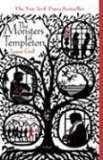Book Club Discussion Questions
In a book club? Subscribe to our Book Club Newsletter and get our best book club books of 2025!
For supplemental discussion material see our Beyond the Book article, A Scenic Tour of Cooperstown, New York and our BookBrowse Review of The Monsters of Templeton.
Please be aware that this discussion guide will contain spoilers!
About This Guide
In her debut novel, Lauren Groff tells the story of Willie Upton, a twenty-eight-year-old graduate student who returns brokenhearted to her ancestral home in fictional Templeton, New York, after her world crumbles under her feet. Equal parts contemporary novel, historical fiction, and ghost story,
The Monsters of Templeton plays with elements as diverse as the relationships between mothers and daughters, the costs of digging into the past in order to understand the present, and what it means to go home. The questions below are designed to help guide your book group’s discussion of this textured, compelling novel.
- What did you think of the range of voices and time periods the author employs in The Monsters of Templeton? How would the novel have been different had the story been told from a single point of view, or been set in one era?
- “As soon as it died, our lives spiraled down,” the Buds lament in Chapter 13, on the death of the Lake Glimmerglass monster (page 151). Why are so many people in Templeton affected by the monster’s death? What did the monster represent to them?
- Given her conflicted relationship with her mother and, to a lesser extent, with her hometown, why do you think Willie Upton decides to go back to Templeton? What was Willie looking for when she returned to Templeton? Does she find it?
- In what instances do ghosts make appearances in The Monsters of Templeton? What do the ghosts represent? What other symbols does the author employ in the novel? What do they mean?
- In the Author’s Note, the author discusses writing about her hometown of Cooperstown, New York, and calling the fictional town Templeton. Do you think that The Monsters of Templeton could have taken place in any other locale? Why is the actual town’s history so important to the book’s present-day events? How would the book have changed if she had decided to call the town Cooperstown?
- For twenty-eight years, Vivienne has told her daughter that Willie was the product of a hippie commune. The day that Willie returns home, she decides to tell her the truth: that her father was a man in Templeton. What would you have done if you were in Willie’s position? Or in Vivienne’s?
- Of the many characters from the past—Marmaduke Temple, Davey Shipman, Charlotte and Cinnamon, Elizabeth Franklin Temple, to name a few—which one(s) stood out for you? Why?
- Vivienne’s life is seemingly full of contradictions: she’s a former drug-using hippie with a child out of wedlock who later converts to Christianity and becomes the chaste girlfriend of a minister. Talk about these and other aspects of Vivienne’s character. How are she and Willie different, and similar?
- What did you think of Willie’s search to uncover her father’s identity? What did each new layer of history teach Willie about her family? Why was it important that Willie learn everything she learned?
- What was your opinion of Ezekiel Felcher at the beginning of the novel? Did it change as the novel progressed? Did you think that Willie might stay in Templeton to be with him? What do you think she should have done? What do you think she will do in the future?
- “This is a story of creation,” says Marmaduke Temple in one of the epigrams before the book begins, ostensibly an excerpt from his own story about how he founded Templeton. In what other ways is The Monsters of Templeton a story of creation? How can Willie’s story been seen as a story of creation?
- The Monsters of Templeton ends with a death and a birth. What does this mean in the larger context of the novel? Who—or what—else is born in the book?
- What does the book’s title mean? Who or what are the “monsters” it refers to? What, exactly, does the word “monster” mean in the context of this book?
Unless otherwise stated, this discussion guide is reprinted with the permission of Voice.
Any page references refer to a USA edition of the book, usually the trade paperback version, and may vary in other editions.
